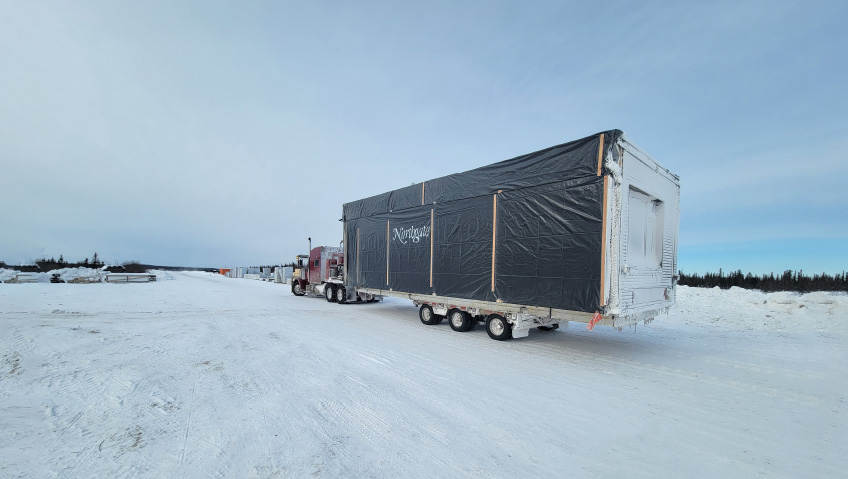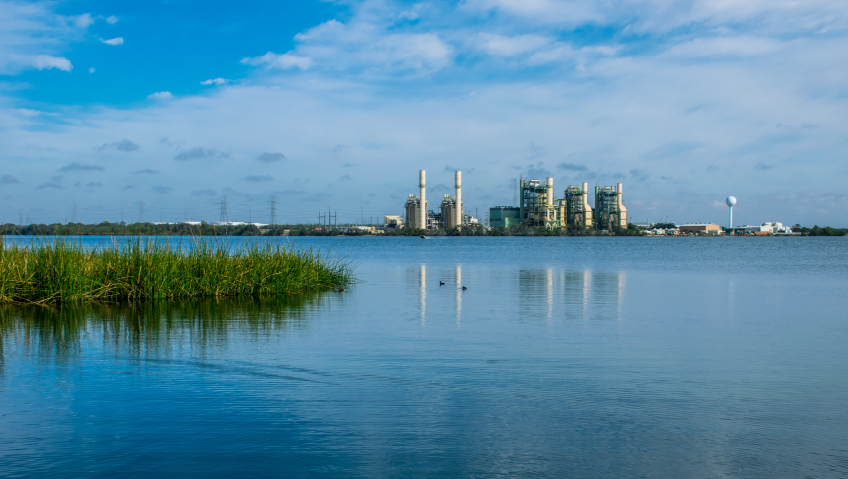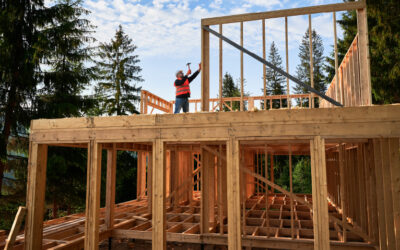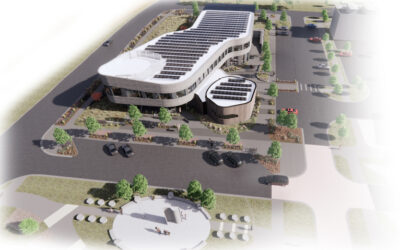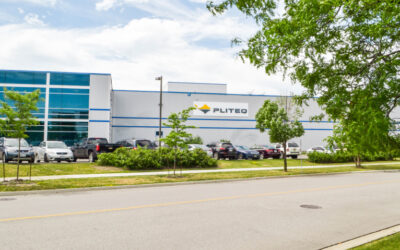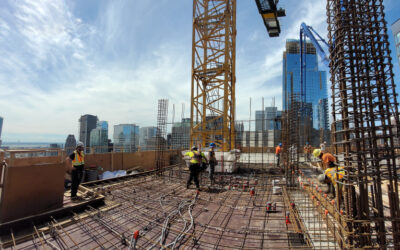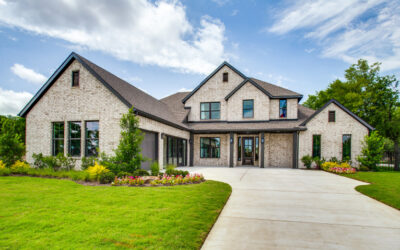Recently, it was our pleasure to sit down with Cheryl Watt, President of Northgate Industries Ltd., to learn the inside story of how the trailer parts and service business, first launched in her parents’ garage in 1968 and incorporated in 1970, came to be.
Located in Acheson, west of Edmonton, Alberta, in a 240,000-square-foot manufacturing space, Northgate Industries is an award-winning modular manufacturing company providing oil and gas, civil construction, and other sectors with both mobile and permanent modular structures since 1970. In addition to the sale of modular units, Northgate operates a leasing department and provides installation and maintenance services for quick occupancy.
From garage to growth
Watt’s father, Sid Braaksma, who passed away in 2019, emigrated from Holland to Canada in 1952. After earning a Journeyman Machinist Certificate from the Southern Alberta Institute of Technology and working for a few years, he invested all his assets into a supply business of trailer parts, then began renovating and selling RVs from his garage, with his wife doing the interior decoration—including sewing curtains—recalls Watt, who took over leadership of the family-owned firm in 2021.
In 1973, Northgate began offering field repair service to mobile units used in the petroleum and construction industries. By 1976, the company was manufacturing modular structures, primarily basic industrial trailers and camp facilities, in a 9,000-square-foot facility, and overseeing their transportation over rough terrain to drilling sites in northern Alberta and Saskatchewan.
In 1998, the company continued to grow when Braaksma purchased an airport hangar in Edmonton that had been built in the 1940s and converted it into an assembly line manufacturing model, quadrupling Northgate’s available manufacturing space. “This was a major stepping stone,” Watt says, “because with modular you need height and space to build the units, and that meant he could begin to compete at a higher level.”
In that decade the company expanded into the U.S. after being awarded a USA military contract for modular structures for a base in Nevada, and opened the Kan-Bud facility to service the petroleum industry in Poland.
“Oil and gas were booming there, and with the wall having come down in Germany, it was the right time to expand in Eastern Europe,” Watt says. That business continues to prosper, with Northgate representatives making regular visits to this day, apart from during the pandemic.
In 1991, Northgate took another step forward, developing turnkey camp solutions and opening its first camp in Calling Lake, Alberta. “My father wanted to branch out into open camps, where workers live closer to the work site,” she explains. “These camps are basically a hotel with a kitchen and dining area and can accommodate from 500 to thousands or more people working on the oil drilling sites in many different areas.”
Accommodations at campsites in Conklin Corner, Alberta and Buckinghorse River in British Columbia, for example, include a mix of executive rooms with individual three-piece bathrooms; suites with large work areas; Jack & Jill rooms with shared washrooms; and standard rooms. Wireless Internet, full housekeeping services, satellite television, and fitness and recreation facilities are included.
These buildings are interconnected by ‘Arctic corridors’ to make moving between them less stressful in the bitterly cold weather. Winter temperatures in northern Alberta frequently dip to minus 30°C (-22°F) or even lower.
Northgate expanded its manufacturing space again in 2010 to its present 240,000-square-foot facility, in order, Watt says, “to meet the increased demand for quality, remote, industrial, and permanent modular buildings.”
Partnering with Indigenous communities
Over its 53-year history, Northgate has developed a high level of expertise in handling building and logistical challenges in remote areas—like the northernmost regions of Alberta, British Columbia, and the Northwest Territories—which often require modules to be transported across waterways on barges or, in the winter, over ice roads.
The company’s expertise in creating permanent modular structures that have been proven to withstand such challenging climate makes it ideally suited to constructing homes and other types of buildings, such as daycares, offices, multi-storey offices, classrooms, and health centres, for remote Indigenous communities in the Northwest Territories, some with as few as 200 residents.
“We have some agreements in place with First Nations and most of the buildings we constructed in the past year, which incorporate culturally enriched designs, have gone to the Territories,” Watt explains. “We’ve had great cooperation with them, and we hope to continue to grow those relationships.”
Northgate, she says, respects First Nations’ treaty rights, employs Indigenous people both as sub-contractors in the Acheson plant and on site, and orders materials through Indigenous suppliers. “They are very much an important part of our business.”
The many benefits of modular
Watt is a firm believer in the multiple benefits associated with modular construction in a controlled fabrication environment. The method offers considerably reduced costs when compared to traditional, on-site construction, which can be subject to weather-related delays and less-than-optimal working conditions.
Detailed advance planning also results in savings because the costs can be narrowed down with a carefully prepared budget, and with all materials on hand and ready to go, there are no surprises and reduced delays once construction starts.
With expert design and engineering, and carefully planned transportation logistics, construction time is shortened, because the foundation can be prepared at the same time the modules are being fabricated, thereby speeding up the process and saving the client money. Because 80 percent of the construction is completed off-site, there is minimal disruption to an active working site and very little site clean-up is required once the units have been set in place by cranes.
As modular construction companies have told us previously, and Watt agrees, a good working relationship with the General Contractor who will prepare the site and zip up the building once the units are delivered is essential.
“Permanent modular is where we need a strong relationship with GCs, consultants, and time schedules, to make sure installation goes smoothly,” she says, “so they know what they’re looking after and so do we. The closer we work with GCs, the more seamless the result.”
Watt also speaks highly of the benefits of information sharing through the Modular Building Institute, which her father joined when he began performing modular construction. “There are a lot of rules and regulations,” she says, “and they were important to bring the industry to its full potential, because it was—and still is, in some areas—a new market.”
Giving back
Watt’s father began the business with the intention of developing a workplace culture that, as it grew, would support its workers with strict health and safety standards and benefit the communities it serves. One way the company achieves this is by being accountable for its carbon footprint, through a policy that insists on using eco-friendly materials and equipment with reduced environmental impact on fragile ecosystems. Another way is through building relationships with members of Indigenous communities and respecting treaty rights.
Throughout its long tenure, Northgate has prioritized sponsorship for several non-profit organizations, including Edmonton’s Cancer Institute, the Spinal Cord Injury Treatment Centre Society, the Stollery Children’s Hospital, Concordia University, the Dutch Cultural Club, and the Shiloh Youth Ranch, among others.
Of course, the very nature of modular construction lends itself to meeting community needs during times of crisis. During the pandemic, Northgate partnered with a General Contractor to build five multi-family affordable housing structures, three to five floors high, plus one seniors’ complex with 12 bungalows, in the City of Edmonton to assist in housing for the record number of homeless people in urgent need in the area. Although there were challenges—including material shortages after a ship bringing supplies went down near Panama, and the rising materials costs for plywood and OSB that affected the entire industry during those years—“we did get them built in a short time and now the city has turned them over to non-profit organizations who will manage these facilities,” Watt shares. And most recently, in the tragic summer of 2023, as wildfires ravaged the Northwest Territories, Northgate Industries announced that it stands ready to support firefighting efforts by supplying modular solutions for sleepers, command posts, and temporary housing.
In everything it does, Northgate Industries is making the tremendous value of modular construction known, and raising the bar on an industry rich with potential.

